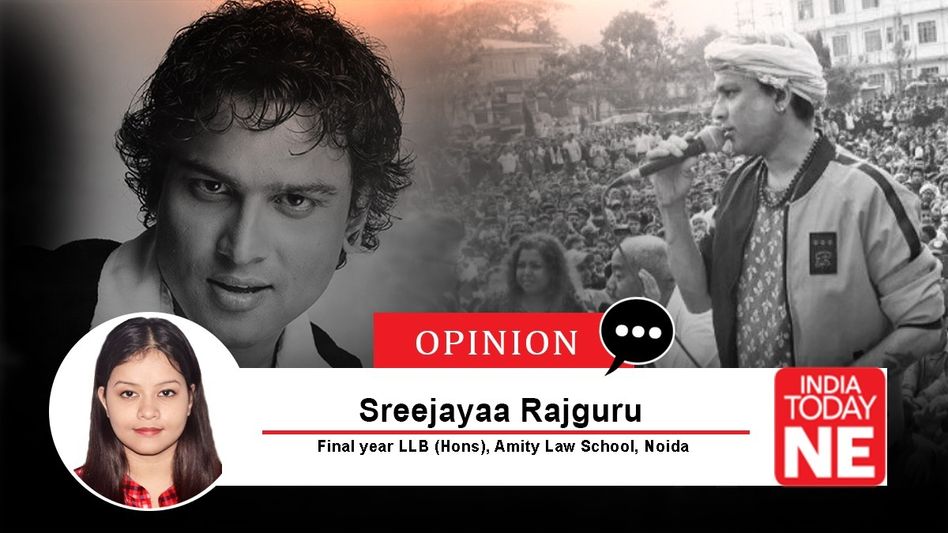Songs of Defiance: Remembering Zubeen Garg’s Politics of Music
Music has always carried more than just melody in Northeast India's cultural landscape, where insurgency, identity struggles, and political neglect have long cast a shadow over daily life. It has also carried survival. None of the voices that arose from this tumultuous land struck a deeper chord than Zubeen Garg's.

Music has always carried more than just melody in Northeast India's cultural landscape, where insurgency, identity struggles, and political neglect have long cast a shadow over daily life. It has also carried survival. None of the voices that arose from this tumultuous land struck a deeper chord than Zubeen Garg's. He was more than just a singer for more than 40 years; he was also a cultural rebel, a philosopher of resistance, and a friend to his people. The beginning of Zubeen's life was turbulent. He was born in Tura in 1972 and grew up in Jorhat during the Assam Agitation and the ensuing decades of insurgency.
Bomb explosions, abrupt curfews, and a general atmosphere of fear that pervaded every home formed the background of his early years. The silence of the night was frequently broken by gunshots rather than lullabies for millennials and Gen Z Assamese, who inherited the trauma of those years. Zubeen's voice broke through the broken silence, offering consolation, defiance, and the prospect of hope. His art was founded on his family's musical background, particularly the influence of his mother. However, that art's urgency and resistance came from the political and cultural upheaval that surrounded him.
Assamese Resistance
One must start with Zubeen's Assamese songs to comprehend his politics of resistance. Their emotional depth and timing gave them a decidedly political quality, even though many of them initially seemed romantic or personal. Songs like Mayabini talked about illusion and longing, but they also represented a desire for purity in a violently corrupted land in Assamese culture. Young people's restlessness was encapsulated by Mon Jaai, who expressed the anxiety of a generation uncertain of the future. Rumal praised the tenderness of closeness, but it also made clear to listeners how brittle relationships can be when things are uncertain. In addition to reaffirming love between people, Pritir Xubaakhe offered a philosophical argument against the politics of division. Monor Nijanot's songs about loneliness struck a chord with Assam's frequent sense of exclusion from the Indian mainstream.
These songs evolved into coded acts of resistance that went beyond simple music. These songs provided reassurance to those whose daily existence was dominated by fear that it was still possible to feel, love, and live. Every Assamese ballad Zubeen performed was therefore also a political statement: to fully live during a period of hopelessness was rebellion in and of itself.
Zubeen entered Bollywood to expand his stage rather than to flee his Assamese heritage. In Gangster (2006), his famous playback Ya Ali caused a stir throughout South Asia. It won over hearts outside of Assam with its spiritual depth and hazy distinctions between suffering, longing, and prayer. Jaane Kya Jaane Mann Bawra from Rules: Pyaar Ka Superhit Formula, another noteworthy song, demonstrated his capacity to bring vulnerability into mainstream Hindi playback in a manner that few others could.
However, Zubeen refused to let Bollywood eat him up. He reminded everyone that his identity was unassailable by frequently returning to Assamese albums and performances. He stated unequivocally in interviews that his soul would always sing in Assamese, even though he could sing in Hindi. In and of itself, this refusal to fully integrate into the Hindi mainstream was an act of resistance. Zubeen insisted on staying true to himself during a period when many local artists were forced to change who they were to gain national recognition. Instead of ignoring Assamese culture, his success in Bollywood gave him a platform to promote it.
The Anti-CAA Movement: When Protest Met Song
Zubeen's political opposition was most overt during the 2019–20 Citizenship Amendment Act demonstrations. Wearing a traditional gamosa, Zubeen stood among regular people in the streets of Guwahati and throughout Assam rather than on a glitzy stage. Protesters found courage in his presence, and his words served as a reminder that they were not alone. Speaking to the audience, he stated that he was there as their brother and not as a singer. This was a show of solidarity rather than a performance for the audience.
To keep the movement's voice alive, Zubeen encouraged the demonstrators to continue singing even after falling ill and needing to be admitted to the hospital. He became, in that instant, what Bob Dylan had been to the American civil rights movement: a reminder that music is a tool for change rather than a decorative element. Through his songs, Zubeen translated political anger into cultural strength, giving people not only words to chant but melodies to carry them forward.
The Damn-Care Rebel
Zubeen's wild, unrepentant spirit was what made him unique beyond his music. He was frequently criticised for his drinking, impatience, willingness to party, and disregard for social norms. However, this was part of his appeal to many of his fans. His carelessness was not just a luxury; it was a way of life in a culture that was always trying to force conformity. Zubeen himself once declared that he didn't want to be flawless because his flaws were what made him who he was.
Similar to Kurt Cobain or Jim Morrison, Zubeen blurred the boundaries between chaos and genius by living on the edge. In a sense, his carefree attitude was another kind of resistance. Zubeen's refusal to conform was a statement of freedom in a state where politics and culture frequently demanded respectability, silence, and obedience. The themes that pervaded his songs, restlessness, longing, and the quest for authenticity at all costs, were reflected in his life.
Assam’s Place in the World of Protest Music
It is impossible to comprehend Zubeen's legacy in a vacuum. He is descended from protest musicians around the world who transformed individual art into group resistance. Zubeen used Assamese folk and contemporary idioms to fight against cultural marginalisation in India, while Bob Marley used reggae to sing against colonial oppression. Songs like Mayabini and Ei Maya Dhorat, Zubeen woven visions of longing and illusion melodies that reminded his listeners of both the fleeting nature of life itself and the fragile beauty of existence. John Lennon envisioned peace and harmony in Imagine. Zubeen put himself in danger by speaking out against the CAA, refusing to keep quiet, and daring to use song as a form of resistance, just as Victor Jara did in Chile by giving his life for singing for justice.
These similarities show that protest music is a global phenomenon that cuts across national boundaries. Voices like these, from Kingston to Liverpool to Santiago to Guwahati, serve as a reminder to the world that music has the power to break down silence and that art can speak where politics cannot.
It is impossible to fill the void left by Zubeen Garg's passing. His music served as the background music for every aspect of Assamese life. His anthems gave voice to resistance in protest grounds; his romantic ballads played at weddings; and his melancholic songs brought tears to students' eyes in dorm rooms. Few artists in history have had such a profound impact on so many facets of life.
His greatest lesson was straightforward but profound: the most potent act of defiance is to live freely; to love is to rebel; and to sing is to resist. Such a legacy cannot be quantified by awards or charts. Instead, it endures in the collective memory of a people who found their hope, their strength, and their reflection in him.
Zubeen's life was a song in and of itself; it was romantic, restless, and chaotic at times, but always profound. Although there is a void after his passing, his voice will always be heard. He urged people to defend their rights, just like Bob Marley did. He dreamed of a better world, just like John Lennon. He put himself in danger for his people, just like Victor Jara did. Above all, however, he was Zubeen Garg Assam's own eternal rebel, the musical comrade whose work will never be forgotten.
Zubeen Garg will continue to live as long as his songs are heard in tea gardens, reverberate through the streets of Guwahati, or reverberate in the quiet of a student's room. His voice will never stop reminding Assam and the rest of the world that music is the most resilient form of resistance. Legends never die.
Copyright©2026 Living Media India Limited. For reprint rights: Syndications Today









